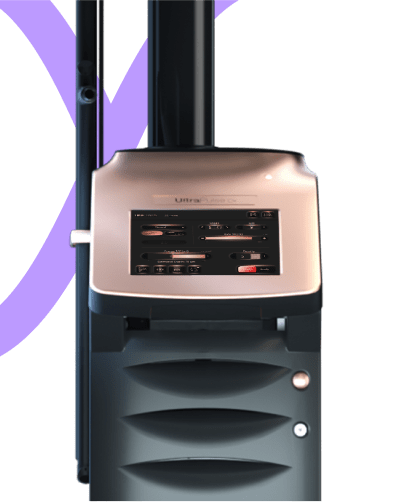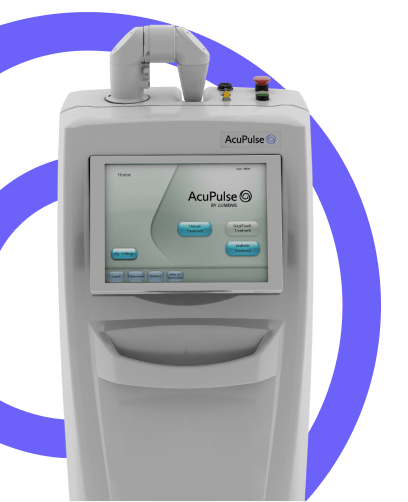CO2 ABLATIVE LASER
Ablative CO2 laser skin resurfacing lasers generate beams of coherent light that are absorbed by the body’s tissue as energy.

This energy is delivered through a narrow range of wavelengths, elevating the temperature in the targeted area, resulting in tissue evaporation or ablation. Ablative lasers effectively treat a broad range of skin conditions by removing all or only parts of the skin in a fractional manner. The body’s natural healing processes then drive the production of new elastin and collagen fibers, which help replace damaged skin with new and healthy tissue.
Although several types of ablative lasers exist, differing mainly by wavelength, CO2 ablative lasers have long been considered the industry’s “Gold Standard” for delivering an exceptional ratio between ablation and coagulation (heating tissue without evaporating it). This standard is backed by more than 30 years of extensive research.
HOW DOES A CO2 LASER WORK?
Exceptional Ablation/Coagulation Ratio
CO2 lasers produce light at a 10,600nm wavelength, which is absorbed by water molecules in the tissue. The laser energy heats up the water until it reaches a boiling point, causing the evaporation of the affected tissue. Some of the heat is absorbed by the tissue adjacent to the ablated target area, causing tissue coagulation which induces hemostasis (the cessation of bleeding) as well as thermal stimulation of deep skin layers, which induces fibroblast stimulation and neocollagenesis (the formation of new collagen).
The laser beam can also be transmitted through a scanner which is a device used to further control the delivery of energy. The scanner regulates the configuration of energy delivered onto the skin, which can range from covering the entire treatment area or just a fraction of it, leaving some areas of untreated skin that drive faster recovery (“fractional ablation”). The overall effect of ablation and coagulation, either full or fractional, is the removal of damaged skin and the stimulation of the body to replace it with newer, younger, and vibrant skin.
FULL RANGE OF ADVANCED CONTINUOUS CAPABILITIES
Lumenis CO2 utilized three types of pulse technology
UltraPulseTM
UltraPulse® technology delivers high peak power in a short pulse duration for deep penetration with ideal ablation and coagulation ratio – penetrating up to 4mm in a single pulse.
Highest Peak Power
Deepest Impact
Narrow, Controlled Thermal Zone
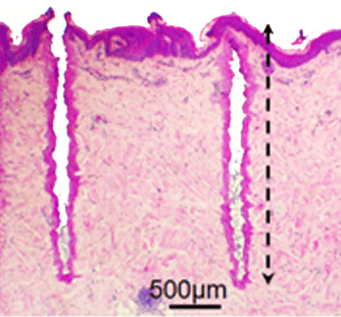
ULTRApulse® Alpha SCAARFX™ Mode
Spot Size: 120µm
Energy: 150mJ
Density: 3%
Not indicative of clinical results
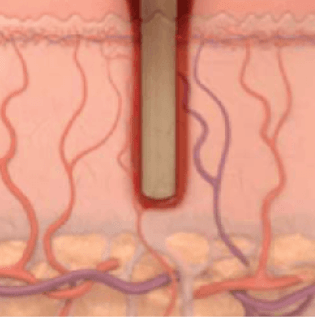
Up to 4mm in a single pulse
SuperPulseTM
SuperPulse delivers High peak power in a short pulse duration for Deep penetration with ideal ablation and coagulation ratio.
Highest Peak Power
Deepest Impact
Narrow, Controlled Thermal Zone

AcuPulseTM DeepTM Mode
Spot Size: 120µm
Energy: 20mJ
Density: 15%
Penetration Depth: 700µm
Not indicative of clinical results
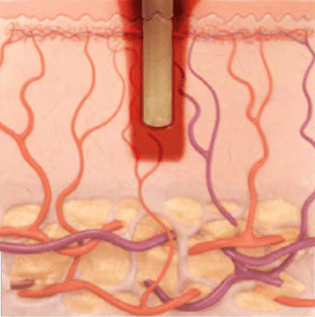
Up to 1mm in a single pulse
Superficial and CW
Delivers Low peak power for superficial impact and wider coagulation zone, used for full ablation and fractional treatments.
Low Peak Power
Superficial Impact
Wider Thermal Zone

AcuPulseTM SuperficialTM Mode
Spot Size: 1.3mm
Energy: 170mJ
Density: 60%
Penetration Depth: 150-200µm
Not indicative of clinical results
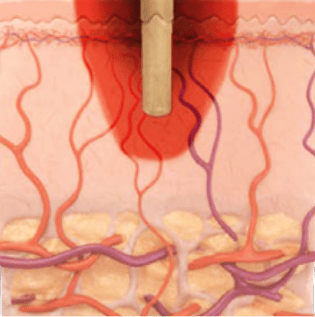
Up to 1mm in a single pulse
~1-2
WEEKS
RECOVERY
30+
MEDICAL INDICATIONS CAN BE TREATED USING LUMENIS’ ABLATIVE CO2 LASERS
CO2 LASER TREATMENTS
Lumenis’ CO2 devices allow advanced treatment of a variety of severely damaged skin lesions which require synergistic coagulation and ablation for advanced resurfacing.
CLICK TO DOWNLOADCLINICALLY
VALIDATED

Hear and Watch the Experts
TESTIMONIALS AND TREATMENTS
LEARN HOW YOU CAN  YOURSELF
YOURSELF
Download ULTRApulseAlpha Info Kit
Learn about ULTRApulse Alpha
PB-1004645 Rev D
